![Charly [1968]](/pictures/1013091.jpg) Charly | DVD | (02/07/2001)
from £N/A
| Saving you £N/A (N/A%)
| RRP
Charly | DVD | (02/07/2001)
from £N/A
| Saving you £N/A (N/A%)
| RRP Released in 1968, Charly is a period-piece from the summer of love when "natural" was nirvana, the air hummed with the mantra "Everybody's beautiful", and all ills stemmed from institutional monoliths such as Science, Government, Education, and Religion. It is adapted from Daniel Keyes' novel Flowers for Algernon and its hero, Charly (Cliff Robertson), is 30 years old and mentally handicapped. His innocent sweetness makes him superior to most able-minded folk, whether they're the bigoted dolts he sweeps floors for or the ambitious scientists who see him as the human equivalent of Algernon, a mouse they've surgically (but impermanently) smartened up. Naturally, post-op Charly, sporting a genius IQ, "sees things as they are". Trotted out as the neurosurgeons' poster boy, he stands up to the "learned" audience--shot as faceless, inhuman interrogators. He's every 60s flower child, berating his "elders" for blighting their brave new world. The one reward Charly derives from his higher IQ is sex. In a lengthy montage resembling a retro TV commercial, he and his teacher (Claire Bloom, a madonna with an eternal Mona Lisa smile) romp through Edenic gardens, their embraces hallowed by sunlight glinting through leaves, moonlight glinting on water, and sappy Ravi Shankar music (stylistic clichés also include embarrassing outbreaks of split screens and multiple small screens within the frame, notably when rebellious Charly turns biker). Robertson's performance is well-meaning but mawkishly sentimental. Still, in the penultimate moments when Charly begins to slide back into mental illness, the actor achieves a genuine tragic gravity, and he became a surprise Oscar winner for his pains. --Kathleen Murphy, Amazon.com
![Queenie [1987]](/pictures/1020115.jpg) Queenie | DVD | (04/03/2002)
from £8.98
| Saving you £-4.99 (N/A%)
| RRP
Queenie | DVD | (04/03/2002)
from £8.98
| Saving you £-4.99 (N/A%)
| RRP From humble beginnings in the slums of Calcutta to the lofty heights of Hollywood fame and fortune Queenie achieves a triumph she never imagined. But dark secrets from her past and jealous rivalries threaten to destroy her. Based on the novel by Michael Korda.
![The Lady And The Highwayman [1987]](/pictures/1017979.jpg) The Lady And The Highwayman | DVD | (29/07/2002)
from £N/A
| Saving you £N/A (N/A%)
| RRP
The Lady And The Highwayman | DVD | (29/07/2002)
from £N/A
| Saving you £N/A (N/A%)
| RRP The Lady and the Highwayman, produced by Lew Grade as part of a series of Barbara Cartland dramatisations in 1987, contains all the ingredients that made Cartland's unique style of romantic fiction so successful. The highwayman in question, known as Silver Blade, is actually an aristocratic outlaw played by a youthful Hugh Grant in a bouffant mullet wig. The lady is Panthea (Lysette Anthony), delicate but firm of purpose, who knows her man when she sees him. It's Restoration England, so the frocks are fabulous. But Cartland's pretensions to historical accuracy evaporate when she makes Charles II's mistress, Barbara Castlemaine (Dynasty's Emma Samms), the villainess of the piece. From there, it's a freewheeling ride of Robin Hood-inspired philanthropy, duplicitous cousins and some uncomfortably fetishistic shots of the rituals and instruments of execution, although everybody is rescued in time for the romantic soft-focus finale. Full of splendidly self-indulgent performances from the likes of Claire Bloom, John Mills and Michael York, The Lady and the Highwayman is a feast of thespian ham. Somehow, the cast triumph over the banality of the basic material. On the DVD: The Lady and the Highwayman is presented in 4:3 aspect ratio with a standard Dolby Digital stereo soundtrack. With an eye on the international market, it looks and feels like any lush mini-series of the 1980s. There are no extras. --Piers Ford
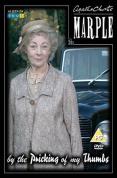 Agatha Christie's Marple - By The Pricking Of My Thumbs | DVD | (17/07/2006)
from £N/A
| Saving you £N/A (N/A%)
| RRP
Agatha Christie's Marple - By The Pricking Of My Thumbs | DVD | (17/07/2006)
from £N/A
| Saving you £N/A (N/A%)
| RRP Agatha Christie's classic sleuth Miss Marple (here essayed by Geraldine McEwan) takes on another case of murder most foul... When Tommy and Tuppence visit an elderly aunt in Sunny Ridge nursing home Tuppence is concerned by one resident - Mrs Lancaster's (June Whitfield) - who rambles about a dead child behind the lounge fireplace. When Tuppence is introduced to one resident's friend - Miss Marple - she finds herself joining forces with her to follow the clues which lead them to t
![Barbara Taylor Bradford [1986]](/pictures/1018666.jpg) Barbara Taylor Bradford | DVD | (10/11/2003)
from £N/A
| Saving you £N/A (N/A%)
| RRP
Barbara Taylor Bradford | DVD | (10/11/2003)
from £N/A
| Saving you £N/A (N/A%)
| RRP A box set containing the following titles: A Woman Of Substance (2 discs) Hold The Dream To Be The Best Act Of Will Voice Of The Heart Her Own Rules A Secret Affair.
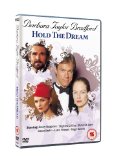 Barbara Taylor Bradford: Hold The Dream | DVD | (08/09/2008)
from £17.31
| Saving you £-3.06 (N/A%)
| RRP
Barbara Taylor Bradford: Hold The Dream | DVD | (08/09/2008)
from £17.31
| Saving you £-3.06 (N/A%)
| RRP In this second installment of the trilogy Emma Harte passes on the Harte business empire to her favourite grand-daughter Paula McGill Fairley who must strive to unite a warring family. This is the story of one woman's determination to find the passion and happiness that should be her rightful legacy.
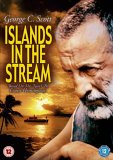 Islands In The Stream | DVD | (27/06/2005)
from £17.95
| Saving you £-1.96 (N/A%)
| RRP
Islands In The Stream | DVD | (27/06/2005)
from £17.95
| Saving you £-1.96 (N/A%)
| RRP George C. Scott plays Thomas Hudson a sculptor whose self-imposed isolation in the Bahamas is ended by two forces; the visit of his sons and the outbreak of World War II... The film is touching in its details of a father's love and heroic in its defiance of tyranny based on the posthumous novel 'Papa' by Ernest Hemingway.
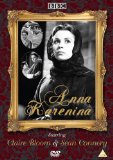 Anna Karenina (DVD) 2010 | DVD | (27/09/2010)
from £19.97
| Saving you £-6.98 (N/A%)
| RRP
Anna Karenina (DVD) 2010 | DVD | (27/09/2010)
from £19.97
| Saving you £-6.98 (N/A%)
| RRP Anna Karenina
![Richard III [1955]](/pictures/1011724.jpg) Richard III | DVD | (17/09/2001)
from £7.95
| Saving you £7.04 (88.55%)
| RRP
Richard III | DVD | (17/09/2001)
from £7.95
| Saving you £7.04 (88.55%)
| RRP The third and final entry in Laurence Olivier's Shakespeare triptych, Richard III is an audacious portrait of a man determined to prove himself a villain. A pure master of the political stage, Richard deploys a barrage of odious, unscrupulous traps in an attempt to exercise complete control over his rivals. As the personification of evil impudence, Olivier portrays the Duke of Gloucester with such aplomb that he even lures the audience on to his side. This is true even as Richard engineers plots to murder his brother Clarence (John Gielgud), betray his cousin Buckingham (Ralph Richardson) and seduce his niece Lady Anne (Claire Bloom). From the play's famous opening lines ("Now is the winter of our discontent"), Olivier delivers every speech with truly Machiavellian splendour. As usual, his voice is a force of nature--a full-bodied coloratura at one moment, an earthy baritone cello a few beats later. As a director, Olivier fully realises but underplays the corners of the script that most directors would hinge their dramatisation on. But he can also play it large: Olivier's superb staging of the climactic battle rivals his work on Henry V. Though Richard is finally brought down by the whispered curses of Queen Margaret, the audience exits feeling that the journey has been both entertaining and complete. Regrettably, this would be Olivier's last Shakespeare film, as a planned adaptation of Macbeth was abandoned for financial reasons. Olivier justly received an Oscar nomination for his performance; and believe it or not, this film was the inspiration for the original Blackadder! --Kevin Mulhall
![Angel's Wild Women [1972]](/pictures/1022267.jpg) Angel's Wild Women | DVD | (14/07/2003)
from £N/A
| Saving you £N/A (N/A%)
| RRP
Angel's Wild Women | DVD | (14/07/2003)
from £N/A
| Saving you £N/A (N/A%)
| RRP Tough biker babes stomp a couple of vicious racist rapists and then cool their heels in a rural commune while the men hit the road for a biker rally. The vacation is short-lived when the women discover the seemingly peace-loving guru is actually a drug kingpin with a vicious gang and a side business in human sacrifices...
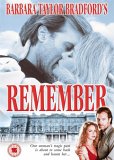 Barbara Taylor-Bradford - Remember | DVD | (26/06/2006)
from £12.98
| Saving you £-6.99 (N/A%)
| RRP
Barbara Taylor-Bradford - Remember | DVD | (26/06/2006)
from £12.98
| Saving you £-6.99 (N/A%)
| RRP News reporter Nicky Wells is shocked when she discovers her former fiance who apparently committed suicide just before their wedding is alive and living in Barcelona. This discovery could cost Nicky her life.... Based on the novel by Barbara Taylor Bradford.
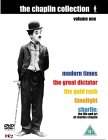 Chaplin Classics Vol 1 | DVD | (22/09/2003)
from £N/A
| Saving you £N/A (N/A%)
| RRP
Chaplin Classics Vol 1 | DVD | (22/09/2003)
from £N/A
| Saving you £N/A (N/A%)
| RRP Modern Times: In this delightfully madcap comedy Chaplin plays a hapless factory worker who cracks under the strain of his job and runs amok. Unemployed on the streets of Depression America he joins forces with a young woman fleeing the childcare authorities and they embark on a misadventure-filled search for happiness. The Great Dictator: Tomanian dictator Adenoid Hynkel has a double a poor Jewish barber who one day is mistaken for Hynkel and comic catastrophes ensue! Gold Rush: The Tramp goes to the Klondike in search of gold and finds a whole lot more! Limelight: Fading comedian Calvero (Chaplin) and suicidally despondent ballet dancer Thereza (Bloom) look to each other to find meaning and hope in their lives... Charlie: The Life And Art Of Charles Chaplin: Richard Schickel's new documentary Charlie chronicles Charles Chaplin's brilliant career as an actor writer director producer and composer as well as his controversial and much publicised private life - his love affairs and four marriages his paternity suit scandal and persecution by the FBI culminating in a self-imposed exile from the United States. With its brilliant observations rare footage interwoven with scenes from Chaplin's greatest films and a remarkable series of newly recorded interviews Charlie is the definitive documentary overview of Chaplin and his Little Tramp.
 Shadowlands | DVD | (06/03/2000)
from £N/A
| Saving you £N/A (N/A%)
| RRP
Shadowlands | DVD | (06/03/2000)
from £N/A
| Saving you £N/A (N/A%)
| RRP 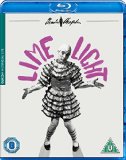 Limelight - Charlie Chaplin Blu-ray | Blu Ray | (28/09/2015)
from £9.79
| Saving you £10.20 (104.19%)
| RRP
Limelight - Charlie Chaplin Blu-ray | Blu Ray | (28/09/2015)
from £9.79
| Saving you £10.20 (104.19%)
| RRP Limelight tells the story of a fading music hall comedian's efforts to help a despondent ballet dancer learn both to walk and feel confident about life again. The highlight of this moving Academy Award-winning film is the classic duet with Chaplin's only real artistic film comedy rival Buster Keaton.
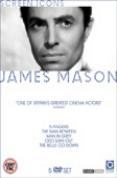 James Mason - The Screen Icons Collection | DVD | (23/07/2007)
from £N/A
| Saving you £N/A (N/A%)
| RRP
James Mason - The Screen Icons Collection | DVD | (23/07/2007)
from £N/A
| Saving you £N/A (N/A%)
| RRP A collection of films starring one of Britain's finest actors James Mason.
![John Osborne [DVD] [2006]](/pictures/1129886.jpg) John Osborne | DVD | (18/01/2010)
from £18.78
| Saving you £-3.53 (N/A%)
| RRP
John Osborne | DVD | (18/01/2010)
from £18.78
| Saving you £-3.53 (N/A%)
| RRP On May 8th 1956, Look Back in Anger changed theatrical history. It's a fact. But why? And in what ways? And could it possibly be true that Osborne wrote very little else of consequence, as some of his harshest critics maintain? And what exactly did his outbursts against the world in which he found himself really represent? Osborne believed in an England which he saw successive governments destroying, and saw himself as almost a lone voice screaming protest - it was as simple as that. But thi...
 DVD DIE 10 GEBOTE | DVD | (19/03/2009)
from £N/A
| Saving you £N/A (N/A%)
| RRP
DVD DIE 10 GEBOTE | DVD | (19/03/2009)
from £N/A
| Saving you £N/A (N/A%)
| RRP ![Charlie Chaplin - Limelight [1952]](/pictures/1012280.jpg) Charlie Chaplin - Limelight | DVD | (22/09/2003)
from £N/A
| Saving you £N/A (N/A%)
| RRP
Charlie Chaplin - Limelight | DVD | (22/09/2003)
from £N/A
| Saving you £N/A (N/A%)
| RRP One of Charlie Chaplin's most personal projects was 1952's Limelight for which he composed the unforgettably haunting score and which featured his son Sydney in a major supporting role. The result is a bittersweet masterwork, a May-September romance between an ascendant ballerina (Claire Bloom in only her second film) and a fading clown. Script and performances are superb, and though entirely studio-made, with London recreated in America, Chaplin's great visual sensibility ensures the production never feels stage-bound. The story harks back to the glory years of Music Hall and in fictionalised form draws heavily on Chaplin's experiences as recounted in his superb autobiography. More affectionate and philosophical than the comparable Sunset Boulevard (1950), the story movingly echoes A Star is Born (1937) and The Red Shoes (1948), while one brilliant touch is the inclusion of Chaplin's fellow "silent" era star, Buster Keaton as his stage partner. Comedy is not forgotten, but this is at heart a moving reflection on the passage of time, a deeply autobiographical work in which the never seen background of the Great War is an ironic contrast to Chaplin's celebration of youth, theatre, music, love and life itself. On the DVD: Limelight is presented in the original 4:3 black and white with excellent mono sound and a picture which apart from a little unobtrusive grain is absolutely immaculate. Also included are French and Italian-dubbed versions and an English Dolby Digital 5.1 version of the soundtrack, which simply adds unnecessary spatial processing to the mono original. The disc features multiple subtitle options, including English for hard of hearing. Disc 2 features a very useful six-minute introduction by David Robinson and an excellent 26-minute new documentary featuring contributions from Claire Bloom, Sydney Chaplin and Bernardo Bertolucci. One remarkable extra is Chaplin's entire Oscar-winning 58-minute score available as 36 separate musical cues in excellent mono. There is a four-minute scene that was included in the original release of the film and later cut, an unfinished short from 1919, The Professor (6 min), which introduces the flea circus idea developed in Limelight, as well as English and Italian trailers. Also included is a nine-section photo gallery and selection of posters, as well as two extracts from Chaplin reading Footlights, the unpublished novel upon which he based the film. Finally, 15 minutes of colour home movies show the star with his family in 1950 and more remarkably, revisiting the London of his youth in 1959. --Gary S Dalkin

Please wait. Loading...
This site uses cookies.
More details in our privacy policy